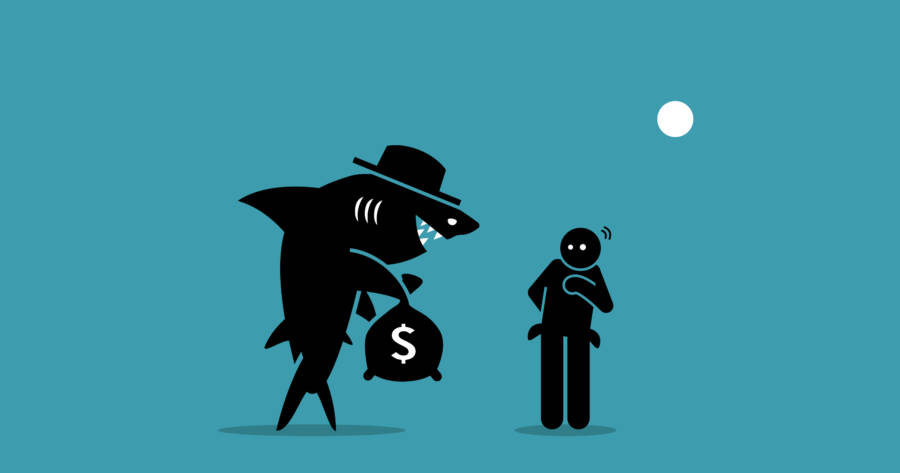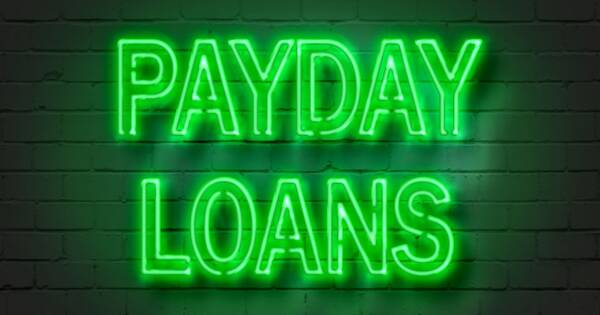Loan sharks are often imagined as violent enforcers straight out of crime films, but the reality is usually far less dramatic. The term simply refers to anyone who lends money at extremely high interest rates, often targeting people who feel they have no other options. The harm typically shows up in drained bank accounts, mounting fees, and damaged credit rather than physical threats. Understanding how predatory lenders operate can help borrowers avoid arrangements that create long-lasting financial trouble.
Definition Of Loan Sharks
Loan sharks generally make short-term loans to those who are experiencing sudden financial difficulty. They charge well above market interest rates to borrow the cash. Payday loan companies such as Money Mart, Eazy Loans, and CashMax are examples of modern-day loan sharks.
As of November 2025, the average personal loan rate is 12.25%. Credit card interest rates generally range between 12% and 28%. As of November 2025, the national average is 19.86%. Loan sharks, however, reach ridiculous levels. They can charge annual interest rates of up to 400%.
These interest rates make it difficult (if not impossible) for the borrower to ever fully repay the loan. They end up owing even more, and probably have to take out a new loan to pay the old one. This process is known as a “debt trap.”
Predatory Lenders
Due to the high interest charged and the trap they place consumers in, today‘s loan sharks are often called “predatory lenders” by their critics and the media. Critics claim that these short-term loan companies prey on people below the poverty line. This segment of the population is already vulnerable anytime they need extra money in a pinch.
Making matters worse, the companies involved in these high-interest, short-term loans are often deliberately unclear about their policies. Their advertising is purposely misleading. They promise something like “Borrow $1,000 for just $20!” What they don’t tell you is that it’s $20 per week, every week, until you pay it back. That’s an average annual interest of over 100%! Many desperate borrowers don’t realize what they’re agreeing to until it’s too late.
How They Work
Payday lenders are, unfortunately, a legal form of high-interest lending offered to consumers. Despite their questionable tactics, they are typically registered entities that follow standard credit application procedures. They will request some personal information for a credit check.
Payday lenders also usually require proof of employment and/or income. They will base the principal amount offered on your typical income and credit profile. In almost all cases, payday loan operators are registered to operate within the U.S. state where they are located. That means their specific regulations vary from state-to-state.
U.S. Presence
Today there are nearly 23,000 payday loan outlets operating in the United States today. About 200 million Americans live in states that allow payday lending without heavy regulations or restrictions. Some states have banned payday loan companies completely. Others, such as Nebraska, have voted to cap the interest rate that can be charged. However, these companies rarely fold up shop and disappear. They rename their products and find legally dubious methods to carry on offering predatory loans.
Currently, the interest rate charged on a typical payday loan is 664%. That’s more than 40 times the average credit card interest rate of 16.22%. That sky high interest rate makes it very difficult for any borrower to repay.
Collection Tactics
Unlike what you might see in movies, these legal loan sharks don’t resort to violence to collect on a loan. They generally follow standard collection procedures if delinquencies occur. This includes reporting missed payments and defaults to credit bureaus.
If missed payments persist, a payday loan company may refer your account to a collection agency. They will be even more persistent in pestering your for payment. Some unscrupulous collection agencies skirt local laws by contacting your family or place of work in order to get a hold of you. They may even try to garnish your wages, which is actually legal in a lot of jurisdictions.
Alternative Loans
In addition to payday loans, other alternative lenders have emerged to lend money to those who can’t qualify for “standard” loans. These lenders offer alternative products that are comparable to traditional loans, albeit with higher interest rates.
However, many of the loans provided by these alternative lenders have lower borrowing standards. That makes their credit more widely available for a greater portion of the general population. These alternative loans also charge extremely high levels of interest and can still result in people getting caught in a debt trap.
Underground Operators
While shady and opaque, most payday loan companies and alternative loan entities operate within the law. However, a growing number of U.S. states are trying to stop their operations — or at least heavily regulate them. However, with the rise of the internet, there are now many organizations that operate only online. That makes them a bit harder to track down and regulate.
Loan sharks that operate underground do not require background checks or credit reports from their clients. They will lend large sums of money with the intention of gaining high levels of interest in a short period of time. A loan shark might lend $25,000 to a person with the provision that $35,000 be repaid within 30 days. These lenders may also call on the debt to be repaid at any time. In some cases, threats of violence can be used as a means of intimidation and enforcement.
In certain circles, real-life loan sharks do still exist. If you spend enough time at a poker table, you’ll hear plenty of stories about people lending or borrowing money from one another, often with unrealistic terms. As a general rule, you should never use a loan shark for any of your borrowing needs — no matter how bad your credit is.
Risks and Consequences
There are plenty of risks associated with any type of loan shark. At best, you pay off the loan quickly and accept the stupidly high interest rate you were charged. At worse, you get stuck in a debt trap of late fees, interest charges, and collection calls. If you borrowed from some shady looking character that looks like an extra from The Sopranos, well, good luck. You’ll need it.
The consequence of this debt trap can be financial ruin in the form of a bankruptcy filing. Anyone who engages with loan sharks are at risk of losing their assets — homes, vehicles, businesses, or life savings. While there’s no such thing as debtor’s prison in the United States (that is, you won’t go to jail for owing money), there are plenty of severe financial consequences that can take years — or even decades — to overcome.
The Bottom Line
Taking out any type of high interest loan is never advisable. Dealing with loans sharks or other predatory lenders like payday loan companies is a recipe for financial disaster. Whenever possible, you should borrow money from a reputable bank or credit card company. They will charge you prevailing market interest rates. You should even try to borrow money from a family member before using a payday loan.
Loan sharks thrive because they are convenient. You can typical get some cash from them after just a short meeting and very little paperwork. Almost anyone qualifies, no matter their credit score. However, it’s ultimately a trap. The extreme interest rates and strict terms make it a situation that you can’t escape from. Many people have been financially ruined by dealing with loan sharks — legal or otherwise.
Always be aware of the interest rate you’re being charged on any loan. If you can’t get a clear answer (in writing), you should decline to borrow the money. The risks and long-term damage to your financial situation and credit score aren’t worth it. Please, we’re begging you: avoid using loan sharks of any type.





